By supporting over 4,6 million online businesses in 175+ countries, Shopify has become one of the largest sales channels in the eCommerce industry. However, this Canadian-based platform still has certain drawbacks and cannot meet everyone’s needs. Given the circumstances, looking for the best Shopify alternatives can help you avoid the pitfalls and increase your chances of success.
This leads to another challenge when selecting the optimal Shopify alternative from the list of hundreds of eCommerce platforms. Worry not, as LitExtension – The World’s #1 Shopping Cart Migration Expert has come to the rescue! Based on our expertise with numerous platforms, we have compiled this blog suggesting:
- Pros & cons of Shopify;
- Why you might need Shopify replacements;
- 17 Shopify alternatives for your consideration;
- and which Shopify alternative is best for your business.
Without further ado, let’s get the ball rolling!
Save Time Migrating?
Our All-in-One Migration Package will come and help you all the way! During the whole process (post, during, and after migration), you will have a Personal Assistant with you and give out ultimate support. Moreover, you will enjoy all our Additional Options for FREE if choosing AIO Package!
What is Shopify?
Known as a full-featured SaaS (software as a service) platform, Shopify makes it easy for store owners to build and scale their online businesses. You don’t need to know a single line of code to run an eCommerce store. Shopify’s extensive capabilities and top-notch applications can help you with everything from product discovery, marketing & conversions to store design & management.
Whether you’re an eCommerce beginner or looking to expand your existing business, Shopify can always come up with the right solution. The flexible pricing plans allow Shopify to meet the demands of businesses of all sizes. If your costs are next to nothing, you can always start for free with Shopify. Then, pay a nominal monthly fee of 1$ for the next three months, and you can try out Basic, Shopify, or Advanced plans. In case you are planning to build an eCommerce store with high volumes and advanced capabilities, Shopify Plus is at your service.

On the downside, hosting an online store on Shopify may cost more than you’d bargained for. Besides the monthly fee for the chosen plan, you might need to pay for the themes, templates, and apps once the free trial elapses.
There are additional transaction fees for third-party payment methods. Moreover, Shopify is quite limited in terms of SEO (search engine optimization), which will be discussed further in the next part of this best Shopify alternatives review.
Below is the short list of Shopify pros and cons, or you can learn more details in our thorough Shopify reviews.
[wptb id=67375]
Why You Should Consider Shopify Alternatives?
As already stated, the deeper you delve into Shopify, the more of its flaws are manifested along the way. In the following lines, we will detail some rational reasons why this reputed eCommerce platform is losing some potential customers to several Shopify competitors.
#1. Payment gateways
Probably one of the most common drawbacks of Shopify is its payment options. If you want to sell from countries that Shopify Payments does not currently support, you will need to use a third-party payment gateway. This could be really problematic for international sellers since Shopify Payments is only available in 17 countries. If you use a third-party provider other than Shopify Payments, you will have to bear remarkable additional fees for every transaction. These are partly for your payment provider, and 2% more for Shopify.
#2. Shopify SEO
To our knowledge, shorter and intelligible URLs are what Google aims for. Hence, having fully editable URLs for optimization is way better than forcing some strings – which is what Shopify does. Shopify SEO functionality doesn’t permit fully editable URL optimization, only /products/ and /categories/ may be enforced. This applies to all product and category pages, which could make the procedure needlessly lengthy.
Shopify SEO doesn’t come with Accelerated Mobile Pages (AMP), but other eCommerce platforms do. If you’re unfamiliar with AMP, it’s a Google technology that uses different, more minimal HTML pages for a website to boost mobile performance. To ensure your Shopify site performs well on mobile devices, you will have to pay for third-party applications to install AMP.
As blogging is not the main focus of the Shopify platform, Shopify blogging features can only satisfy people with basic needs and requirements. In categorizing posts, Shopify blog posts only permit you to use tags. No categories are available.
#3. Product options & variants
If you plan on products appearing in different formats, paying particular attention to product options and variants is essential. Nonetheless, Shopify provides users with limited product options and variants.
You can only create 100 product variants, even though that can involve up to 3 product options. To extend the limits, you will (again) have to pay for a third-party app.
#4. Features limitation
When selling with Shopify, you may need to pay a lot of money to add extra features to your site. For example, a few features included in several Shopify competitors’ entry-level plans, such as real-time shipping rates and reporting, are only available on Shopify’s most expensive pricing tiers.
Therefore, the more functionalities you add, the higher your bill will be. Besides, although Shopify may stand out with numerous available apps, it may happen to be a disadvantage in comparison to alternative solutions that include more default functionalities.
How to Find The Best Shopify Alternatives For Your Business?
Before choosing an alternate solution from a long list of eCommerce platforms like Shopify, it’s critical to point out the key qualities that the new platform should provide. This way, you can be certain that the Shopify alternatives will address all of the previously mentioned issues instead of creating new ones.
Hosted solutions
First things first, the best Shopify alternatives that you should consider are other hosted eCommerce solutions. Since Shopify is a hosted solution itself, you might have been getting used to the intuitive interface, super-fast build time, and various integrated features that one can avail of right from the dashboard.
Therefore, re-platforming from Shopify to another hosted solution is much more convenient and less time-consuming. Besides, self-hosted Shopify alternatives are also promising.
Multiple payment options
Since limited payment options are a huge drawback of Shopify, you shouldn’t make the same mistake twice. This time, make sure the Shopify alternative you choose comes with a wide variety of payment processing providers. Every customer has their preferred way of settling the payment, so providing a familiar payment method is quite decisive.
On top of that, the best Shopify alternatives surely come with the ability to transact and settle in numerous currencies. You may not have targeted the overseas market yet, but confining yourself to the current consumer base is not a good idea.
Customization opportunities
There are millions of online stores on the internet. Consequently, emphasizing your uniqueness to make your business stand out from the crowd is essential.
If you haven’t had the opportunity to take advantage of your coding talents when utilizing Shopify, make it count this time. Among the best Shopify alternatives, choose one that allows you to make adjustments that will appeal to your target audience easily.
Things are fine if you don’t go along well with coding. Among the list of alternatives to Shopify, go for the drag-and-drop option, which permits you to build an entire online store with a few clicks.
Best Shopify Alternatives: 17 Free & Paid Options You Shouldn’t Miss
Now that you know why you should migrate to a Shopify alternative and what to look for when choosing the new destination for your eCommerce store. Let’s go right through the most crucial part when we discuss the best Shopify alternatives: the overview, pros and cons, and what makes them ideal choices for Shopify alternatives.
Before that, here is a brief comparison of the best hosted and self-hosted Shopify alternatives.
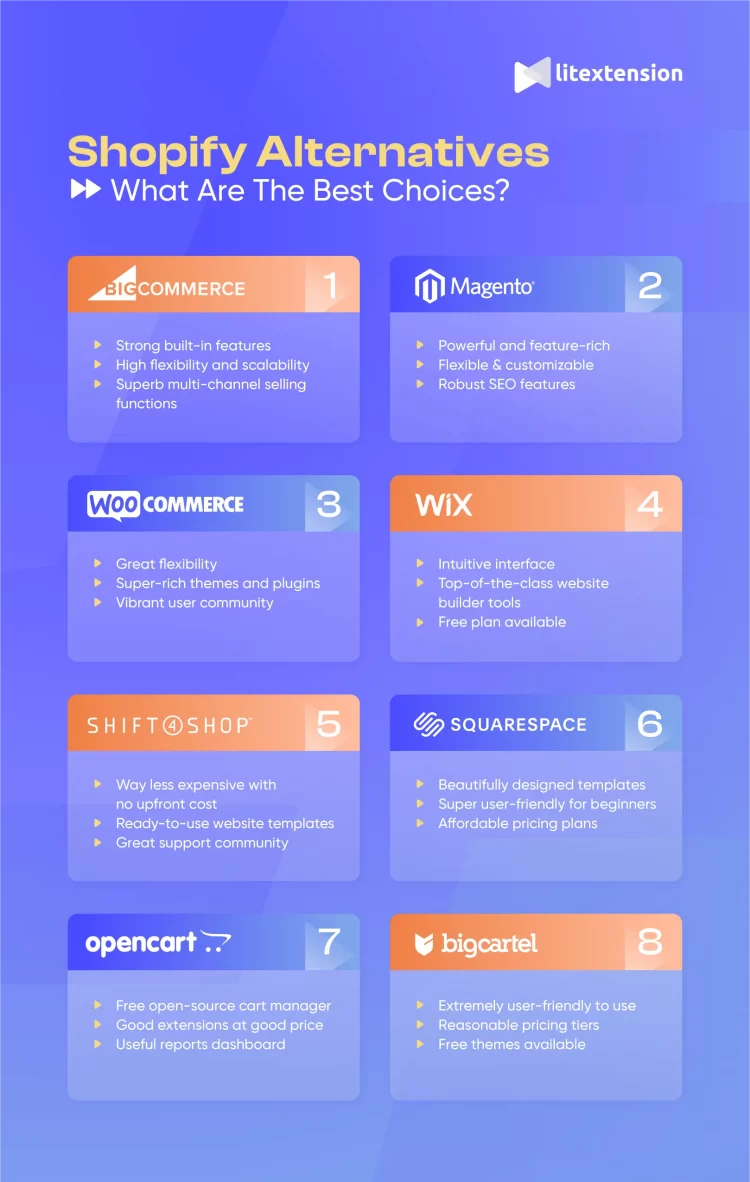
#1. BigCommerce
What is BigCommerce?
BigCommerce, Shopify biggest competitor, is likewise a versatile SaaS eCommerce platform. While Shopify makes it simple for eCommerce beginners to build the online store of their dreams, BigCommerce is better suited for individuals who are already acquainted with eCommerce and looking to scale up their businesses.
BigCommerce Pros: What BigCommerce does better than Shopify?
With both being top-notch open eCommerce platforms, let’s make a quick BigCommerce vs Shopify comparison and see if BigCommerce can overcome its rival’s disadvantages and become one of the best Shopify alternatives.

BigCommerce Payment Process
If you are leaving Shopify for its limited SEO optimization, BigCommerce will make a great option for a Shopify alternative. Unlike its contender, BigCommerce allows you to make full editing of URLs. The URL structures can then be adjusted for products, web pages, and categories. It can also be long, short, or custom URLs, depending on your priority.
On top of that, BigCommerce is quite a fast platform with an average response time of 361ms (Source: BigCommerce). Meanwhile, platforms that rely on add-ons and third-party integrations like Shopify might decrease your site’s performance.
Product Options and Variants
As aforementioned, Shopify is limited to product options and variants. On the contrary, BigCommerce’s “product options” and “product rules” enable you to create multitudes of product options, which can be up to 600.
Other BigCommerce advantages
Multi-currency features are huge pros of BigCommerce. These not only allow merchants to reinforce and enhance cross-border operations but also enable them to enlarge their consumer base and sell in multiple countries. Moreover, BigCommerce users can customize the pricing at a higher SKU level with pricing lists, which is simply impossible with Shopify.
With Shopify, real-time shipping rates and reporting are only available from the Advanced plan. On the flip side, BigCommerce includes the feature in all of the pricing tiers. They also offer a wide range of amazing built-in marketing features and toolsets, which are accessible within a couple of clicks.
If you need unrestricted staff accounts for your eCommerce stores, then BigCommerce is undoubtedly the better choice. While the Shopify Advanced plan can cost up to $399 per month for 15 staff accounts, every BigCommerce plan allows you to use an unlimited number of staff accounts. This is indeed a good reason to consider migrating to BigCommerce.
If you want to have a deeper comparison between the two eCommerce giants, don’t miss our detailed Shopify vs BigCommerce comparison.
BigCommerce Cons
Still, BigCommerce has certain downsides. If you are planning to leave your current platform for this Shopify alternative, keep in mind that there are not as many themes to choose from as you get with Shopify. Moreover, BigCommerce’s built-in features require a bit more technical background. There is no phone help, so you only have to rely on other ways of customer support.
BigCommerce Pricing Plans
[wptb id=67378]
There’s also a pricing option for high-volume businesses called BigCommerce Enterprise Plan. The price varies depending on your business size, often starting from $1,000 and can range up to $15,000 per month.
Who is it for?
All this said, BigCommerce is one of the best Shopify alternatives. With tons of built-in features, data tools, and various support methods, this hosted platform is best suited for large or fast-growing businesses.
#2. WooCommerce
What is WooCommerce?

WooCommerce was brought to life in 2011 by WooThemes developers. This Shopify alternative serves as an open-source plugin that converts any WordPress site and blog into an eCommerce store. If you have previous experience with WordPress, WooCommerce is one of the best Shopify alternatives for your online business.
In case you are struggling to set up a new WooCommerce store, check out this video for a detailed WooCommerce tutorial:
What WooCommerce does better than Shopify?
WooCommerce Payment Process
The first advantage of WooCommerce over Shopify is that it comes with a zero-transaction-fee option called Core Payment Options. There’s no annual WooCommerce subscription cost, and sellers are not required to pay any transaction charge to the platform. The sellers, therefore, only need to pay transaction fees and other associated costs to the payment gateway.
WooCommerce also provides users with numerous options for premium payment gateways, including WooCommerce Payments. While WooCommerce Payments is free to install and does not require any monthly charge, you will have to buy the premium gateway extensions and pay annual subscriptions to WooCommerce along with the transaction fees.
WooCommerce SEO
If your concentration revolves around blogging (yet Shopify proves to fall short), WooCommerce could be an up-and-coming Shopify alternative. Since its early days, the platform has been renowned as a professional blogging solution. It allows you to save an archive of changes to existing posts and make use of categories and tags in each blog post while keeping URLs rather clean.
What’s more, WooCommerce comes with an exceptional SEO function. That’s a common reason many Shopify merchants choose to migrate to WooCommerce. Yoast is the #1 SEO plugin for WordPress, which assembles more than five million site users thanks to excellent SEO functions:
- Metadata Editing – Modifying text displayed on sites for search results.
- Suggestions for internal linking – Tips for creating a new web page on the best sites to connect.
- Redirects – automatically send a new URL while updating the slug on an existing page.

Customization ability
As WooCommerce is a PHP-based plugin integrated with WordPress, you can directly access the code via browser and FTP. In general, you have complete control over your eCommerce store and can easily access the platform’s plan or code. If you are willing to pay, several bespoke developers will create whatever extension for WooCommerce you wish.
Besides, with the utilization of REST API, you could include an extra layer of functionality in your WooCommerce store. That will allow you to customize data types and grow outwards to incorporate new software. Therefore, you can increase your website’s capacity to provide more value to users.
In case you want a more head-to-head comparison between WooCommerce vs Shopify, click here for our detailed analysis.
WooCommerce Cons
That being said, WooCommerce still has some downsides that might affect your decision to choose it as your alternative to Shopify.
While WooCommerce is a free WordPress plugin, it doesn’t mean you can build a WooCommerce store without charge. You might have to ponder the additional costs, such as hosting, a domain name, extensions, and an SSL certificate. Therefore, if you ever consider WooCommerce as one of the best free Shopify alternatives and are set to migrate, think twice.
Additionally, WooCommerce, as an open-source eCommerce platform, comes with high risks of technical issues. There is no phone-based customer support; assistance is only available for extensions developed by and/or sold on Woo.com. Hence, if you are a tech-novices and once had a custom-made extension, you might need to engage a developer to address the issues.
WooCommerce Operational Costs
As you prepare to open an eCommerce store on this Shopify alternative, you may have many questions in mind, such as “Is WooCommerce free?” or “How much does WooCommerce cost?”.
Although WooCommerce is a free plugin to add to your current WordPress site, you still need to pay extra charges to keep your store running. For example, you may need a WooCommerce theme to distinguish your store from the competition and a premium payment gateway plugin that allows your customers to opt for their favorable way of payment settling.
Therefore, WooCommerce pricing varies from store to store, with different themes and plugins installed. That said, the actual cost to run a WooCommerce store might consist of the following:
- Mandatory cost: Hosting & domain, themes, shipping & payments, security;
- Optional cost: Customer experience, marketing functions, and developers hiring.
Who is it for?
While WooCommerce can work very well for most eCommerce businesses, this Shopify competitor thrives for medium-to-large businesses alike. With exceptional SEO functions and flexible customization ability, WooCommerce allows store owners to centralize and scale operations easily. All in all, WooCommerce is one of the best Shopify alternatives that you should not overlook.
#3. Wix
Wix Overview
Founded in 2006, Wix is a cloud-based eCommerce platform offering an excellent drag-and-drop site builder to create small websites. Wix has been empowering nearly 4 million websites all over the globe, making it one of the best Shopify alternatives. If you are looking for free alternatives of Shopify, then Wix is the perfect solution for your eCommerce needs.

Wix Pros: What Wix does better than Shopify?
Wix Payment Process
When selling with Wix, you can choose your preferred payment gateway among 70+ supported providers without paying any transaction fees to the platform. Alternatively, use the platform’s own payment processor, Wix Payments, and enjoy tons of exclusive benefits.
Wix SEO
When it comes to SEO functionality, there is an aspect of Wix that outdoes Shopify called ‘cleaner’ URLs. Wix gives you the ability to make full URL edits. Switching to AMP, though Wix doesn’t have it built-in, you can still activate AMP by setting up AMP plugins for free.
Wix Design Customization
With Wix, you will be able to choose various templates to build your store. Plus, you can also choose your favorable method, Wix Editor or Wix ADI, to customize your website appearance.

With Wix Editor, you can customize everything from web applications to page scrolling by simply hitting “Code” and “Developer Tools”. By doing these simple steps, you’ll completely take control of your Wix website’s appearance.
Things are much simpler if you choose to use Wix ADI. Based on your answers to some simple questions, Wix ADI can design a unique website for your eCommerce business. Alongside diverse themes, features, and add-ons, Wix is an excellent Shopify alternative to provide you with high-level functionality and customization.
Wix Built-in features
In addition to the excellent site-building tools, Wix also provides free and premium business-specific features. Being one of the best Shopify alternatives, Wix provides solutions for different types of businesses, including photography, video, and service-based businesses. You can find many impressive visual effects with images and text, which graciously fade in and out as users scroll across a site.
Wix Product options and variants
In the area of product options, Wix has the edge over Shopify by permitting store owners to create up to 6 product options (e.g. size, color). Plus, there are 100 option choices and a total of 1000 variants (e.g. combination of size and color).
Click here to learn the detailed difference between Wix vs Shopify.
Wix Cons
If you prefer Wix to Shopify and are about to migrate your store, here are some notes you should bear in mind. Wix doesn’t allow you to switch templates once you’ve built a site, which means you might have to build things from scratch if you are no longer happy with the existing templates.
Adding to that, if you plan on selling internationally, Wix might not be the best Shopify alternative for your needs. This platform doesn’t support true multi-currency selling.
Wix Pricing Plans
Wix pricing may vary depending on your location, but there are always 4 fixed pricing tiers to suit different needs.
[wptb id=67379]
There’s also an enterprise option built for large-scale businesses, with faster content deployment, a dedicated account manager, a multi-site dashboard, and so on.
Who is it for?
Wix is an excellent Shopify alternative for small businesses on a tight budget since its pricing plans are more budget-friendly. Moreover, if you are looking for a small eCommerce integration for your content-focused website, Wix may be the best solution for a wide array of reasons. To conclude our ideas, Wix is better suited for anyone looking to create a “general-purpose” website thanks to its low cost, ease of use, SEO capabilities, and extensive template library.
Check out this video for a comprehensive Wix vs Shopify comparison:
#4. Magento (Adobe Commerce)
Adobe Commerce Overview
One of the best Shopify alternatives that we cannot miss is Adobe Commerce (former name Magento). As an open-source eCommerce platform since 2008, Adobe Commerce satisfies over 140,000 website users (Source: BuiltWith) with its customization ability and a wide range of apps and extensions.

Magento Pros – What Adobe Commerce does better than Shopify?
If you are wondering whether migrating to AdobeCommerce is better for your business, here are some advantages you should consider.
Adobe Commerce Payment Process
Like most best Shopify alternatives, Adobe Commerce doesn’t charge you any transaction fees for using third-party payment gateways. When running eCommerce businesses on this platform, you may choose from a variety of payment processors.
Adobe Commerce SEO
Adobe Commerce allows you to configure URL rewrites, so you’ll have full control over URL editings. Moreover, you’ll have unlimited product options and variants. This is a huge plus if you want your products to appear in all shapes and sizes.
Adobe Commerce Built-in features
Adobe Commerce optimizes itself to switch up to thousands of products, tons of traffic, and a large number of sales. To be able to do it, this Shopify competitor has the most extensive feature lists you could ever find. There are approximately 350 of them by default in the case of Adobe Commerce.
Some features that Shopify either require third-party apps or advanced pricing tiers have been initially built in Adode Commerce. For example, single-page checkout, multi-language capability, and reporting.
The list is truly infinite when it comes to quantity, but here comes the most important built-in feature:
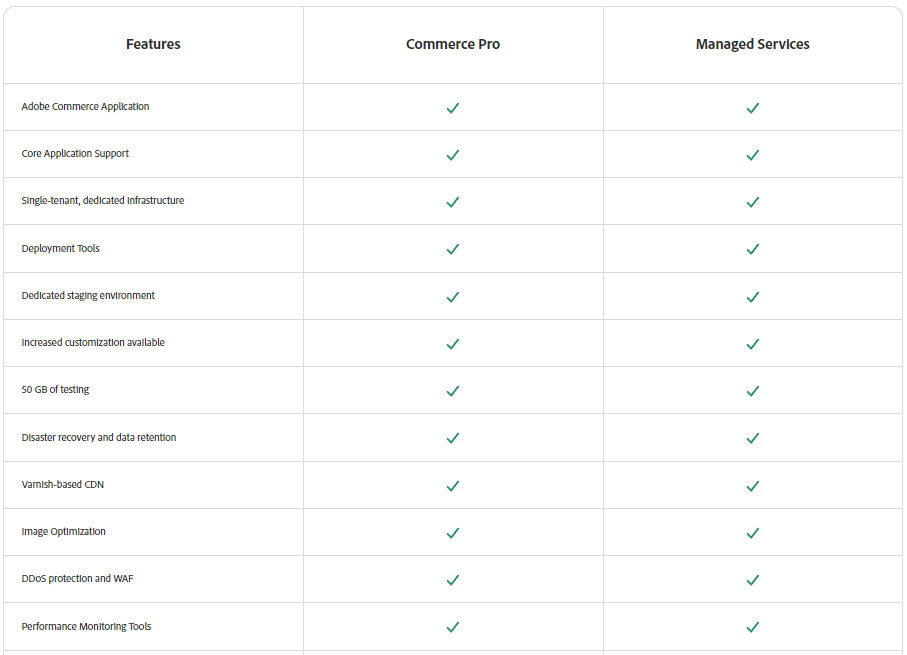
Other advantages
As an open-source eCommerce solution, Adobe Commerce allows a wide scope for site improvements. That way, retailers can unhesitatingly scale up their business to any size. If your business flourishes, Adobe Commerce can easily satisfy all your needs.
If you want a detailed comparison between Adobe Commerce vs Shopify, don’t miss our thorough analysis.
Adobe Commerce Cons
Although Adobe Commerce can be a solid solution for those seeking the best Shopify alternatives, there are some disadvantages you might consider before making a purchase. As an open-source eCommerce platform, Adobe Commerce requires high-tech skills with a steep learning curve. The extensions can be costly, and with the pricing tiers (which will be listed right below), this Shopify alternative is not really geared toward small businesses.
Adobe Commerce Operational Costs
Being known as a robust open-source platform, Magento is mostly used for free. You can download, install then utilize it without paying a dime. However, when it comes to running an entire eCommerce store on this Shopify alternative platform, you might have to spend a great deal of money.
Currently, Adobe Commerce offers 02 pricing packages: Adobe Commerce Pro and Managed Service. The prices are mainly based on your annual gross merchandise volume (GMV) and average order value (AOV) and can cost up to $200,000/year based on your business size.
Besides that, if Adobe Commerce is your next destination for your eCommerce business, you need to keep the following additional charges in mind:
- Implementation costs: These are for the initial setup and customization of the platform. Sometimes, it also includes third-party integrations or extensions to be installed.
- Hosting costs: You will be responsible for hosting and maintaining the server environment.
- Supported and maintenance costs: The fees for software updates, security patches, and technical support are vital when running your eCommerce store on an open-source platform.
Who is it for?
While its pricing tiers might frighten small businesses, Adobe Commerce (Magento) is an ideal option for large merchants with multiple stores and warehouses. With greater customization options, more well-developed built-in features, and immense scalability, Adobe Commerce makes an ideal choice for Shopify alternative.
#5. Shift4Shop
What is Shift4Shop?
Shift4Shop is an all-inclusive eCommerce platform founded in 1997. Among the best Shopify alternatives, it works as an excellent eCommerce website builder, offering merchants around the world a simple and powerful solution to create and manage their online stores.

What Shift4Shop does better than Shopify?
Shift4Shop Payment Process
Shift4Shop enables connection with 160+ payment processors – the most supported payment gateways in the market today. This ensures a smooth transaction from almost any corner of the world and makes this platform the best Shopify alternative for international-selling merchants. What’s more, Shift4Shop doesn’t charge any additional transaction or integration fees like Shopify – the reason why some merchants choose to migrate from Shopify to Shift4Shop.
SEO & Product options
While Shopify users cannot edit the robots.txt section, Shift4Shop makes it possible for users to access the file and have full control of how search engines index their sites. Adding to that, this Shopify alternative supports up to 200 advanced options per product, which leaves Shopify miles behind with only 100 product options.
Shift4Shop Built-in features
Shift4Shop comes with over 200 built-in features, which hands you incredible functionalities to excel in your eCommerce store. Adding to that, all Shift4Shop plans include advanced features such as single-page check-out, professional reports, domain registration, customer and product reviews, vouchers, saved carts, built-in AMP, and more. Only the Advanced Shopify plan (which costs about $399 per month) offers those features.
Flexible Customization ability
Rank high in the best Shopify alternatives list, Shift4Shop features a vast selection of themes with 100+ professionally designed and conversion-optimized options. All themes appear elegantly on mobile or tablet devices thanks to the mobile-optimized display feature.
One significant advantage is that a majority of Shift4Shop themes (up to 112) are free yet uniquely designed. Meanwhile, the free options of Shopify are fewer and identical, with just a few changes in colors. When selling with Shift4Shop, merchants can pick a suitable template for their business without paying a dime.

Shift4Shop Cons
While the flexibility of templates is a huge benefit of Shift4Shop, some users find the interface with many customization options overwhelming and difficult to navigate. Adding to that, customer support can be inconsistent sometimes. Some report that the technical website and phone support are helpful and accessible. On the contrary, many complain it’s too difficult to reach and inadequate.
Shift4Shop Pricing Plans
[wptb id=67380]
Who is it for?
In general, eCommerce newcomers or those looking for affordable yet centralized eCommerce solutions can opt for Shift4Shop. While Shopify is well-known as an ideal option for beginners and small businesses, this Shopify alternative wins over thanks to the included features at the same pricing tier.
Adding to that, sellers seeking a no-code eCommerce platform or simply want an easy-launch process can also be satisfied with Shift4Shop.
#6. Squarespace
Squarespace Overview
Launched in 2003, Squarespace is marketed as a content management system (CMS) for creating and managing blogs, portfolio sites, and online storefronts. This Shopify competitor has hosted over 3 million live websites to date (Source: BuiltWith), making it the internet’s second most popular hosted choice.
With over 300,000 active Squarespace online stores (Source: BuiltWith), it’s not an exaggeration to say Squarespace is one of the best Shopify alternatives. Unlike other open-source platforms that generate lines of code to build a website (such as WooCommerce or Magento), Squarespace’s drag-and-drop interface allows businesses of all sizes to easily create professional Squarespace websites. It’s not strange that thousands of merchants choose to migrate to Squarespace.

Squarespace Pros: What Squarespace does better than Shopify?
Squarespace Payment Process
While Squarespace offers just a few payment options, including PayPal, Stripe, and Square, we believe these serve most buyers’ payment needs. You don’t have to worry about transaction fees charged for using third-party payment gateways if you use Commerce plans. In case you are fine with the Business tier, the surcharge is 3% applied for physical products and services.
If you bring your brick-and-mortar business online, you can use the Squarespace Point Of Sale to process and manage in-person cash and card payments.
It’s worth noting that Squarespace is about to launch its own payment processor – Squarespace Payment. US users will be the first ones to experience the services, while other markets have to wait until 2024.
Squarespace SEO
While access to the robot.txt file is not possible, Squarespace has 90% of the SEO options that every eCommerce store needs. The platform automatically generates a sitemap.xml file listing all the URLs and image information with proper priority for perfect indexing. HTML markup is also clean, and this Shopify alternative comes with built-in mobile optimization and uptime site loading.
Customization flexibility
While all Squarespace templates are professionally designed to satisfy the highest standards of usability, performance, and mobile responsiveness, you are still able to modify the templates to your heart’s content. It’s possible to add as many sections as you want and change fonts, colors, and animations in bulk to create a unique look for your site.
You can even go the extra mile by editing the template files behind your Squarespace website using HTML, CSS, and JavaScript.
Still unsure about which platform to choose between Shopify and Squarespace? Take a look at our detailed Shopify vs Squarespace comparison and find out the ultimate solution for your store.
Squarespace Cons
Still, there are some downsides you need to consider before leaving Shopify for Squarespace. The dashboard could be a bit tricky for beginners, and you will not be able to switch to another template since version 7.1. What about re-designing your store? Your site may run slower than usual during front-end editing, and if you are going to utilize the drag-and-drop builder, you can do it in the available sections only.
Squarespace Pricing Plans
[wptb id=67381]
Who is it for?
Squarespace makes an excellent Shopify alternative if you want a simple and easy-to-use website builder. The platform is praised for its superb usability, so it’s ideal for people with little to no technical experience.
Amongst the best Shopify alternatives, Squarespace is also an affordable choice for small business owners looking for a budget eCommerce solution with basic capabilities.
#7. OpenCart
What is OpenCart?
OpenCart is an open-source eCommerce platform based on the PHP programming language and geared specifically for online enterprises. This platform offers users website design customization, a modern, user-friendly dashboard interface, and a wide range of themes.
Multi-store creation is a popular OpenCart feature that allows you to access and manage many stores from a single interface. This platform also includes eCommerce capabilities, including promotion/discount services, product category management, loyalty point accumulation, and more.

What OpenCart does better than Shopify?
OpenCart Payment methods
From bank transfers to online payment gateways, OpenCart offers a wide range of payment options. It supports 36 different payment methods, including 2Checkout, PayPal, Amazon Pay, Shop Pay, and others. Additionally, the OpenCart Marketplace makes it simple to integrate new payment options.
With a wide range of payment options as well as charge-free payment, OpenCart makes a great Shopify alternative. Unlike those who utilize OpenCart, Shopify users have to pay transaction fees for each sale they make.
OpenCart Customization ability
For good reason, many hosted eCommerce sellers migrate their stores to OpenCart. As an open-source eCommerce platform, OpenCart allows users unrestricted access to and modification of the source code. When utilizing OpenCart, you’ll have complete control over the backend of your site. As a result, the customization options for your store’s appearance and functionality are virtually unlimited.
OpenCart added features
With over 13,000+ additional extensions accessible on the OpenCart Extension Store, OpenCart is a great option for apps and add-ons. Furthermore, the OpenCart developer community makes it simple to personalize your store at a reasonable cost.
If you are wondering which platform does a better job when it comes to eCommerce extensions, OpenCart or Shopify, the former deserves a solid win. The majority of OpenCart extensions are designed for eCommerce and directly related to your work. You can utilize your coding skills to develop custom fields that work in conjunction with the extensions. This provides you with limitless customization options for creating a powerful website.
OpenCart Cons
As an open-source eCommerce solution, OpenCart comes with a rather complicated installation, especially for tech novices. The support documentation is not easy to use, and the built-in features may not be sufficient for a complicated eCommerce website when compared to similar PHP-based open-source systems. Adobe Commerce (Magento), another ideal option in this best Shopify alternatives list, allows users to scale from one website to several websites while managing them from the same system.
On top of that, the loading speed can be quite slow sometimes, which might affect your customer shopping experience.
OpenCart Pricing Plans
OpenCart is free to download and install, yet it is not a free Shopify alternative. To be able to create an OpenCart store, you might need to pay for some extras:
- Hosting plan: around $10/month.
- A domain name for your store: Around $10/year or so.
- An SSL certificate: Depending on the needs of the store owner, the price will vary.
- An eye-catching theme/template & additional modules/extensions: $100 on average.
Who is it for?
If you are all about the best free Shopify alternatives, you should not miss out on OpenCart. Even those without a technical background can have an online store up and running in a matter of minutes, thanks to OpenCart’s intuitive, user-friendly interface and numerous customization options.
Adding to that, the multi-store creation functionality makes this Shopify alternative an excellent choice for individuals wishing to manage multiple stores from a single platform.
#8. PrestaShop
What is PrestaShop?
PrestaShop is a feature-rich and user-friendly open-source eCommerce platform. To put it simply, you can download it and then adjust it to whatever you like. However, it doesn’t mean that PrestaShop is a free eCommerce platform and can make a free Shopify alternative. To download the software (and alter it later), you will have to pay additional maintenance fees.

What PretaShop does better than Shopify?
- Payment process: PrestaShop provides 250 payment options, including a third-party processor or a merchant account with the PrestaShop Checkout.
- PrestaShop SEO: This Shopify alternative comes with pretty solid built-in SEO features. You will fully control how your products appear on Google search, including SEO title, meta description, and permalink. Moreover, the platform features a unique SEO module that helps you write friendly content for both users and search engines.
- Customization ability: With its open-source nature, PrestaShop offers endless possibilities for customization. Merchants can freely customize their stores as they wish using the features buttons or access the underlying code and edit the CSS, HTML, and JavaScript files.
If you want to learn all the differences between the two platforms before migrating your store to PrestaShop, follow the link for a detailed PrestaShop vs Shopify comparison.
PrestaShop Cons
- As an open-source eCommerce platform, the learning curve on this Shopify competitor is quite steep.
- There are just a few free options available when using PrestaShop, which means you might have to spend extra costs for additional features.
- You will be in charge of updates, domain, server, and the development and implementation of changes. Meanwhile, hosted solutions like Shopify will take care of these tasks for you at a fixed, affordable price.
PrestaShop Operational Costs
As previously mentioned, PrestaShop isn’t a zero-expense eCommerce solution. You’ll have to pay for hosting services and a Secure Socket Layer (SSL) Certificate, ranging from 4$ – $14 per month.
Due to its open-source nature, whatever modification you make requires code involvement. If you are a tech novice, the cost of running a PrestaShop store may also include developer expenses, which range from $50 to $80 per hour.
Charges for add-ons and modules can cost between $35 to $6000, which is more expensive than most of the eCommerce platforms.
Who is it for?
All in all, PrestaShop can be a freemium Shopify alternative for eCommerce beginners who are comfortable with coding languages and only require basic eCommerce functions. Other companies that want ownership of their content and have yet to use WordPress might find PrestaShop a great option as well.
#9. Ecwid
What is Ecwid?
Ecwid, or “eCommerce widget”, is a SaaS solution to help small businesses succeed. What makes this platform unique is that eCommerce retailers can integrate their existing stores with Ecwid and start selling much more efficiently. There’s no need to close your Shopify store, and the integration can be done within minutes.
The forever free plan of Ecwid is what distinguishes the platform from a long list of best Shopify alternatives. Many businesses choose to migrate to Ecwid to boost sales easily and make money for free.

What Ecwid does better than Shopify?
If you are considering between Ecwid vs Shopify, here’s why Ecwid could make a better fit than its competitor:
- Ecwid offers a totally free plan, which is feature-rich and covers all the fundamental demands of store owners who only wish to sell a few products on their sites. In case you want to add more eCommerce features to your Ecwid store, the upgrade prices are quite reasonable. What’s more, this Shopify alternative can convert any existing website into a full-featured online store.
- You don’t need to pay any transaction fees for using third-party payment gateways. There’s no limit on product options as well.
- If you are going to sell digital files, then Ecwid is the eCommerce solution you need. The file size limit is quite generous (25GB compared to 5GB of Shopify).
Ecwid Cons
- If you are seeking a Shopify alternative that allows you to customize the store to your heart’s content, Ecwid is not a good option to consider. The platform customization ability is quite limited and requires a good technical understanding.
- Chat and phone customer support are only available for premium plans.
Ecwid Pricing Plans
[wptb id=67382]
Who is it for?
Since Ecwid can be embedded into any existing website, social media, and marketplace, it is an ideal Shopify alternative option for multichannel merchants. Ecwid offers a forever-free plan, so one can test out new products, new channels, or new selling methods.
In case you are still unsure which platform will best suit your business needs, our Ecwid vs Shopify comparison can be of assistance.
#10. Weebly
Weebly Overview
Known as one of the fast-growing platforms in the market, Weebly is a hosted eCommerce solution powering roughly 02 million websites all over the globe (Source: BuiltWith). This Shopify alternative allows you to create an online store in just a few minutes using the drag-and-drop website builder.
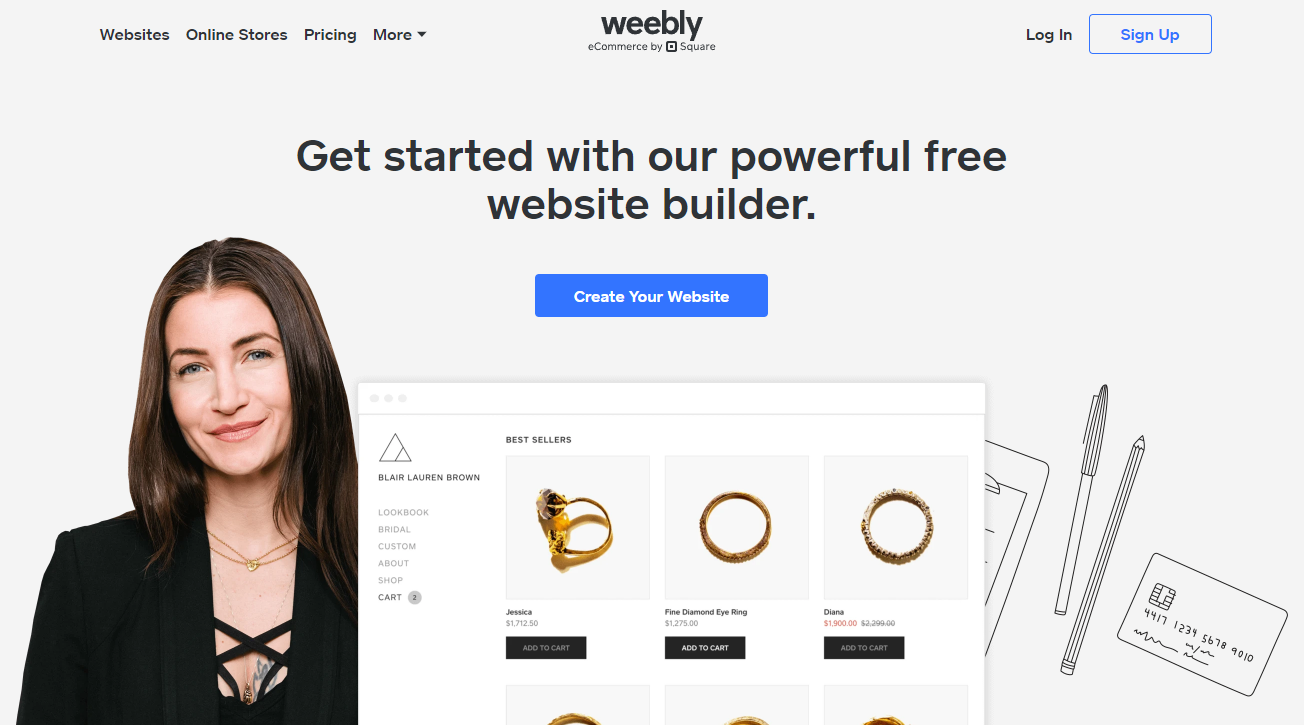
Weebly Pros
While Shopify can win over Weebly as a whole-package eCommerce solution, there are certain aspects that Weebly persuades Shopify users to migrate their stores.
- Weebly is much more affordable than Shopify, with a free plan and pricing tiers starting from only $6 per month.
- Weebly offers a wide range of templates, all free, and it’s easy to switch between them.
- The blogging and SEO tools of Weebly can satisfy anyone looking to grow their online business, and the platform even provides storage and domain for free!
- There’s a mobile app to manage your store easily, in whatever place.
If you want to learn the detailed differences between the two platforms, here’s our comprehensive Weebly vs Shopify comparison.
Weebly Cons
- Poor backup system;
- Limited customer support methods on the starter plan;
- Limited design optimization on templates.
Weebly Pricing Plans
[wptb id=67383]
Who is it for?
With an intuitive drag-and-drop interface, Weebly is a great option for tech novices to create an online store after a couple of clicks. This Shopify alternative is also a good choice for businesses seeking eCommerce features at an affordable price.
#11. PinnacleCart
PinnacleCart Overview
Positioning as a marketing and conversion leader in the eCommerce platform market, PinnacleCart is an excellent Shopify alternative with a strong focus on marketing. If you are seeking in-house design and marketing services, migrating your store to PinnacleCart is surely worth a try.
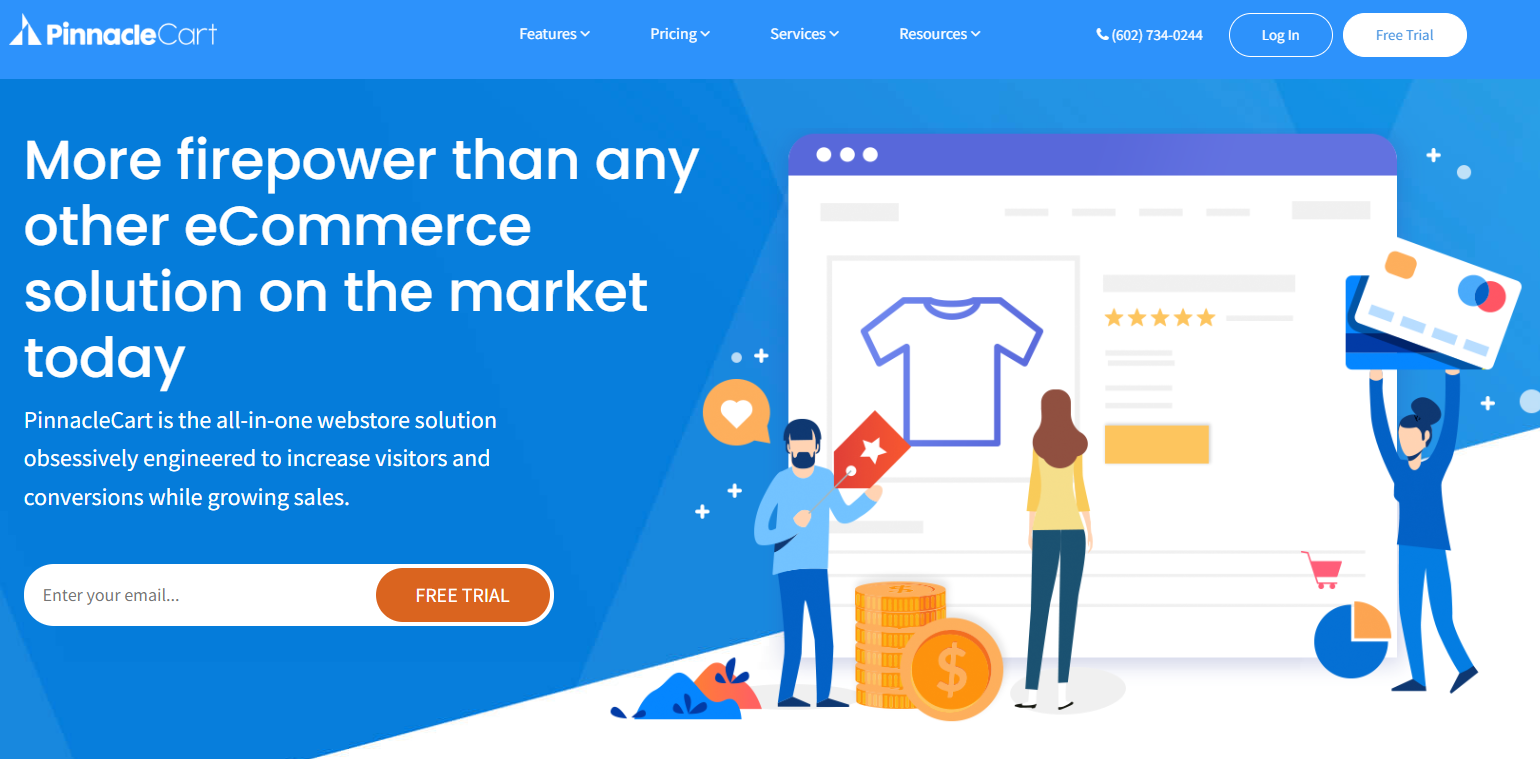
What PinnacleCart does better than Shopify?
- PinnacleCart Payment Process: This Shopify alternative supports roughly 40 payment processors and doesn’t charge any transaction fees.
- PinnacleCart SEO: The platform features numerous mobile-friendly templates, and it’s easy to access several SEO-optimized product pages. Unlike its competitor, PinnacleCart allows you to customize the URLs and provides SEO-friendly features such as schema.org tags.
- Customization ability: When utilizing PinnacleCart, you’ll have complete control over your store. Moreover, you can integrate your site with leading CRM, sales, and marketing tools.
- On top of that, PinnacleCart offers unlimited products and categories on every plan. The platform’s product syndication also gives exposure to various platforms such as Google Shopping, Amazon, eBay, Facebook, etc.
If these advantages mentioned above are what you seek in a Shopify alternative, consider moving your store seamlessly and with our All-in-One migration service. You may save tons of time and manual effort while our specialists take good care of the entire process, provide regular updates, and deliver the finest migration result.
PinnacleCart Cons
- While Shopify offers a wide selection of themes and templates, PinnacleCart only features 12 themes.
- The lowest plan has bandwidth and storage limits, so you’ll have to pay as you grow or switch to a higher plan for unlimited bandwidth.
- There’s no POS system to track inventory and sales.
- In our experience, PinnacleCart provides quite limited customer support. While there are many ways to get your problems solved (live chat, email, phone, or even customer group), the turnaround time is unpredictable, and it can take so long to get to an agent.
PinnacleCart Pricing Plans
[wptb id=67384]
Who is it for?
PinnacleCart is intended for all sizes of businesses. It works for entrepreneurs who do not have the technological knowledge to sell their products online and, at the same time, makes a perfect eCommerce solution for multichannel merchants selling across multiple platforms. PinnacleCart also makes an excellent Shopify alternative for those seeking platforms with a strong focus on marketing.
#12. Square Online
Square Online Overview
Known as Square’s basic eCommerce solution, Square Online is a viable solution for eCommerce newcomers to test a product idea or start safely on a small budget. There’s a free version with transaction fees charged for every payment, but it’s still worth a try with the included features. You will be able to list unlimited products and enjoy shopping cart functionality with Square as your only payment processor.
Beyond that, this Shopify alternative can adapt to a wide variety of industry-specific needs. If you are running a brick-and-mortar store, use Square as your POS system, and you will be able to manage your inventory or add stocks to different places from a single dashboard. In case you are a service provider, you can go ahead and pair Square Online with Square Appointments to keep track of bookings.

Square Online Pros
So the question is, Square or Shopify? Is it worth migrating your store to Square? Let’s take a quick comparison between Square Online vs Shopify and see if Square has a chance to win over the eCommerce giant and become of the best Shopify alternatives.
- User-friendly interface and easy to get started;
- Great features at affordable prices;
- Easy to integrate with other eCommerce platforms such as BigCommerce, WooCommerce, Shift4Shop, etc.
- Excellent built-in marketing features (email marketing, paid advertising, etc.);
- Easy to keep track of product sales, abandoned carts, and customer journeys.
Square Online Cons
- The dashboard is quite simple, and there are not many options when it comes to site customization.
- The loading speed is slow during site customization.
- There is no step-by-step guide on how to create a store, which might confuse users with little to no experience with the platform.
Square Online Pricing Plans
[wptb id=67385]
Who is it for?
Of all the best Shopify alternatives, Square is an ideal option that goes along well with businesses of all types and sizes. Especially when you want to bring your brick-and-mortar business online, Square POS can get your store up and running in no time. Managing the inventory is now made easy with Square, as you can manage the orders in a single dashboard.
#13. BigCartel
BigCartel Overview
Among the best Shopify alternatives, Big Cartel is a straightforward eCommerce platform tailored to musicians, creatives, and influencers. This solution is currently powering over 70,000 live websites (Source: BuiltWith), a rather small number when compared to other platforms in this best Shopify alternatives list.

BigCartel Pros
If you are an artist wondering between Shopify and BigCartel, here’s why BigCartel makes a better choice than its rival and become one of the best Shopify alternatives.
- First and foremost, BigCartel is an eCommerce solution designed just for you, the creatives. Hence, everything on this platform, from the homepage to fonts and colors to every feature, is like music to your ears.
- BigCartel offers super useful prompts and is fairly easy to use. You don’t have to have a technical background to run an eCommerce store on this platform.
- There’s a free plan (up to 5 products) to make use of, and the paid options are cheaper than Shopify and other Shopify alternatives.
- You can freely customize your storefront using the free themes. Plus, there are no transaction fees charged on sales you make.
Do these advantages tick all the boxes? If yes, why wait any longer for a Shopify to BigCartel migration? Our All-in-One migration package can save you lots of time and effort, with our migration expert taking care of the whole process!
Want to learn the detailed differences between BigCartel and Shopify comparison? Follow the link for more information.
BigCartel Cons
- Limited integrations;
- Limited apps and marketing functions;
- Lack of deep analytics (although it integrates with Google Analytics).
BigCartel Pricing Plans
[wptb id=67386]
Who is it for?
As previously mentioned, BigCartel is the best Shopify alternative for musicians, creatives, and influencers. The features are all geared toward creatives, but it’s more suitable for start-ups and small businesses than full-fledged eCommerce operations.
#14. X-cart
X-cart Overview
Next in our best Shopify alternatives list, Xcart is an all-in-one open-source eCommerce solution that allows merchants to handle orders, track inventory, and manage all aspects of an eCommerce store. As of now, X-Cart has built roughly 21,000 online businesses all over the world. (Source: BuiltWith).
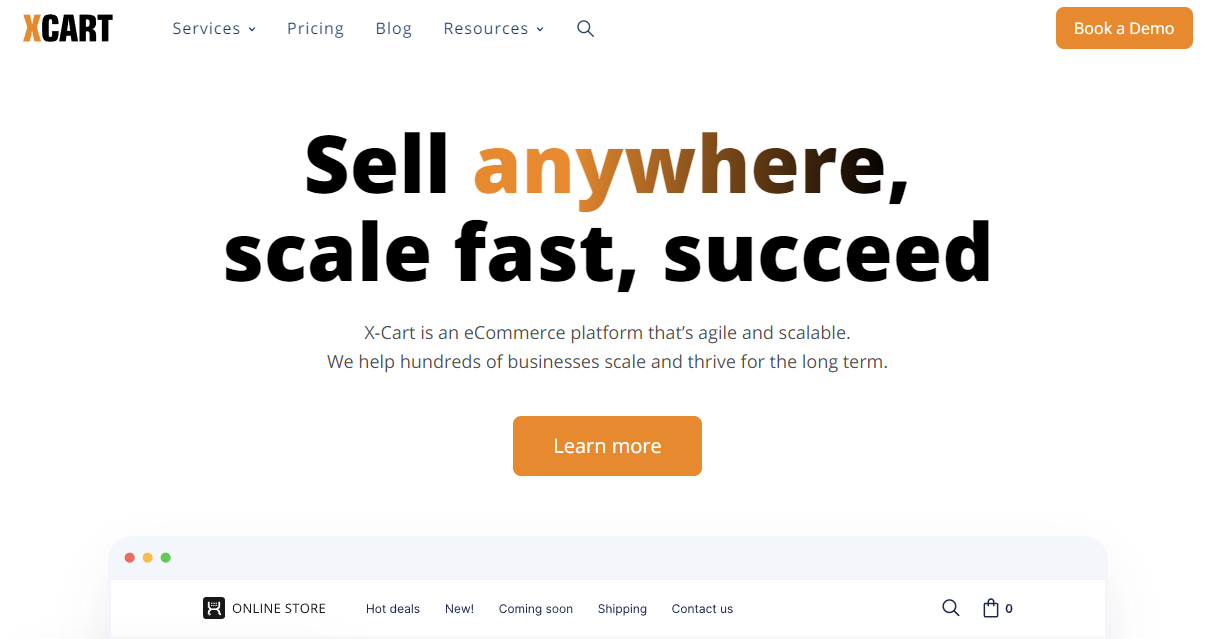
X-cart Pros
- Provide 120+ payment processing providers and charge a monthly fee based on the number of transactions;
- Allow users to combine online stores with external add-on apps;
- Give out a deep insight into sales & customer service.
X-cart Cons
- A basic understanding of PHP, CSS, and JavaScript is required;
- Limited options for themes (8 free and 45 paid options);
- Customer support is available at charge;
- The blogging feature is not available.
X-cart Pricing Plans
Being one of the best Shopify alternatives, X-cart is free, open-source software: sellers can utilize the feature-rich edition to run their businesses without paying a dime. However, it’s impossible to access the source code for customization needs. Purchasing a license grants you access to more features plus the customization ability.
There are 3 premium plans: Business Edition ($495 license), Multi-vendor Edition ($1,495 license), and Ultimate Special Edition ($5,995 license). These license fees are one-time payments, but you still need to pay more to keep your site up-to-date.
Adding to that, this Shopify alternative is still open source, which means you might have to pay incurred costs to run your eCommerce website. For example, the hosting fee with X-cart hosting starts from $27.95/month.
Who is it for?
If you are a small, tech-savvy business wanting to launch, X-cart can be an ideal option. Midsize businesses and large enterprises can also utilize this Shopify alternative to establish a global brand.
#15. Volusion
Volusion Overview
Among the list of best Shopify alternatives, Volusion may be the oldest eCommerce website builder. It provides online businesses with software and services and works well for small to medium companies with fewer products to sell.
Up to now, this cloud-based solution has provided excellent eCommerce functionality to over 50,000 online businesses all over the globe (Source: BuiltWith). The convenient one-click checkout is the most popular feature that improves the shopping experience on your website.
It’s worth noting that Volusion comes with limited bandwidth, which requires you to pay as you grow. What’s more, you need to have some coding skills to build up your store properly when utilizing this Shopify alternative.

Volusion Pros
- Provide a huge range of payment processors, including popular options such as PayPal, Stripe, Amazon & ApplePay. No transaction fees are required.
- Feature 1000+ apps through Zapier;
- Support multichannel commerce.
Volusion Cons
- Difficult to sell digital products on the Volusion eCommerce store;
- Limited marketing features;
- Poor customer service;
- Sales limit based on GMV.
Volusion Pricing Plans
[wptb id=67387]
Who is it for?
Volusion is one of the best Shopify alternatives for businesses with tech-savviness, time, and hope to build a scalable online store. However, when compared to Shopify, this platform is not an affordable option. In compensation, Volusion provides a wide range of eCommerce features and a mobile app for users to manage their business on the go.
#16. Sellfy
What is Sellfy?
Being one of the best Shopify alternatives, this eCommerce platform allows you to start for free with 10 listings. If you want to add more products to your store, you’ll need to upgrade your subscriptions. Based on your requirements, the monthly price can vary between $29 to $159. In case you are not happy with the purchase, Sellfy offers a 30-day money-back guarantee.

What Sellfy does better than Shopify
When comparing Sellfy vs Shopify, there are notable Sellfy advantages that win over its rivals and become one of the best Shopify alternatives.
- No transaction fees are charged for using third-party payment gateways;
- Useful drag-and-drop store builder;
- No limitation on selling products;
- Great customization ability;
- Built-in print-on-demand;
- 30-day money-back guarantee;
- And an active community of over 32,000 creators.

Sellfy Cons
- The free version is limited, with 10 listings and a low customization ability;
- Limited integrations and extensions;
- Basic marketing functionality & limited SEO capabilities.
Sellfy Pricing Plans
[wptb id=67388]
Who is it for?
Despite being developed for creators and artists, this Shopify alternative can be used by anyone with a product to sell. Nonetheless, with the provided features, Sellfy is one of the best Shopify alternatives suited for store owners selling digital products and print-on-demand.
#17. Dukaan
Dukaan Overview
Last but not least on the best Shopify alternatives list, Dukaan is a mobile-first solution that helps to launch and manage an online store from the comfort of your mobile device. Built with speed, performance, and simplicity at its core, Dukaan is a lightspeed, modern Shopify alternative that is preferred by both small and large businesses in India.
Backed by a 100% money-back guarantee, Dukaan markets itself as a cheap Shopify alternative that can “double your Shopify revenue risk-free”. With an extensive library of plugins, this eCommerce solution is also ideal for individuals who want to build and scale faster than the competition.
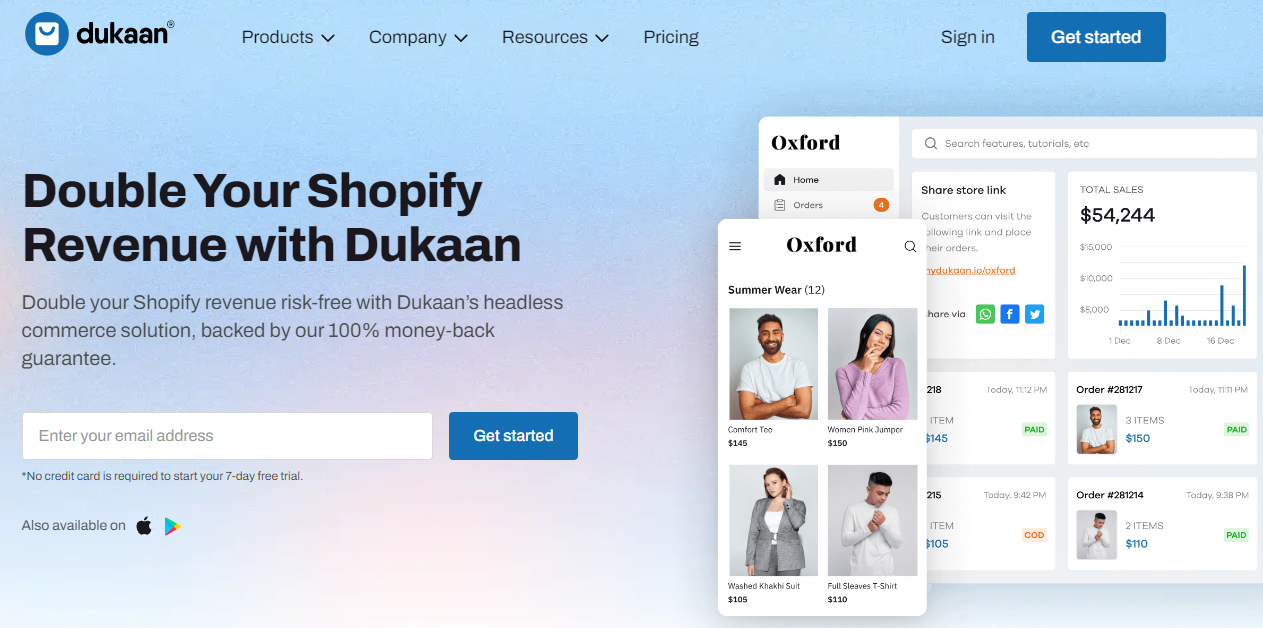
Dukaan Pros
In general, both Shopify vs Dukaan offer a seamless eCommerce solution. Nevertheless, there are a few points that Dukaan offers a better experience and becomes one of the best Shopify alternatives.
- Unlike Shopify, Dukaan offers a 7-day free trial that allows users to test all features before purchasing.
- There are customized templates for specific social platforms you promote your business on, such as Facebook, Instagram, and WhatsApp.
- There is no transaction limitation or transaction fee. Dukaan also does not limit the number of products sold in your store.
Dukaan Cons
- There are just a limited number of pre-built templates.
- Dropshipping is not possible on the Dukaan platform.
- The analytics section is quite basic.
- There’s only one option to manage your Dukaan eCommerce store on mobile devices. No web browser management is available.
Dukaan Pricing Plans
[wptb id=67389]
Who is it for?
All this said, Dukaan is a feature-rich, easy-to-use, and affordable Shopify alternative for Indian companies. Not only the pricing plans are in the Indian rupee, but the platform also offers a range of Indian payment options and convenient Hindi call support. However, Shopify is still a better option if your company is to go international.
Best Alternatives to Shopify: What to Conclude
If you are looking for Shopify alternatives that are most closely comparable to Shopify and could solve most of Shopify’s drawbacks, you might consider one of the all-in-one hosted solutions. These are BigCommerce, Shift4Shop, Weebly, and Big Cartel.
On the other hand, if you have development resources and want truly unique customization for your online store, open-source platforms like AdobeCommerce, WooCommerce, OpenCart, PrestaShop, or X-Cart may be good Shopify alternatives.
If you’re a smaller business looking for a business content-driven website, a web-builder solution like Wix or Squarespace might be the best for you.
And if you are an artist or a digital creator, BigCartel, Sellfy, and Selz will make the best Shopify alternatives for your business with features catered to digital selling.
Best Shopify Alternatives: FAQs
[sp_easyaccordion id=”67393″]
Final Words
To sum up, there are a lot of Shopify alternatives that have their own strengths and may suit your needs. Choosing a suitable platform for your business means reflecting upon your needs, goals, budget,..etc. With that, you can smartly end up with the best Shopify alternative that hits all the right spots.
In case your Shopify store can’t cater to your business as you wish, making a platform switch to one of the best Shopify alternatives is of utmost importance.
In that advent, choosing the appropriate migration method is as important as choosing the right platform to transfer to. With 250,000+ migrations completed, LitExtension is #1 the world shopping cart migration expert you can count on.
Give your business a fresh start with these best Shopify alternatives, and enjoy the brand-new excitement! LitExtension is always willing to help you with the eCommerce re-platforming process. If you have any questions, don’t hesitate to contact us. We are always 24/7 ready for anything from you.
Other than that, don’t forget to join our active community and follow our Retailers Blog for more updates on eCommerce trends.
